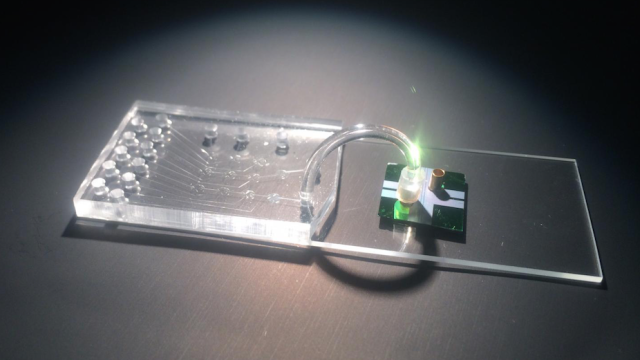In the highly unfortunate case you’re infected with Ebola, you really need to catch it ASAP so that you can quarantine yourself and get treated. That’s why scientists are now developing a portable ‘Ebola chip’ that optically analyses fluid samples and sniffs out nasty virus particles within minutes.
Ebola detection relies on a method called polymerase chain reaction (PCR), which essentially involves copying a telltale fragment of DNA thousands to millions of times so that we can see it. Trouble is, Ebola isn’t made of DNA. Rather, the virus is encoded as RNA, DNA’s single-stranded cousin. So before we can “see” Ebola using PCR, we have to deploy special enzymes that translate its genetic code from RNA into DNA.
The entire process can take hours, not to mention the fact that it requires bulky lab equipment, expensive chemical reagents, and a biosafety level 4 setting. Detecting specific genetic sequences on a chip without all that infrastructure is basically the Holy Grail of molecular identification.
Enter the Ebola chip, designed by researchers at UC Santa Cruz and described today in Nature Scientific Reports. The system, which combines a microfluid chip for sample preparation and advanced optics for virus detection, offers sensitive results across a million-fold range of viral particle concentrations. At the same time, the technology is able to accurately distinguishing Ebola from its less-deadly cousins, Sudan virus and Marburg virus.
The goal is to integrate the chip into a simple, portable instrument for rapid field testing. But there’s a bit more R&D to do before we get there. The main hang-up is that the technology currently isn’t designed to handle raw blood samples. There’s still pre-processing to be done, and that still needs to happen at a specialised facility. But the UC Santa Cruz team is working on a new prototype that can start with a blood sample and do a complete front-to-back analysis.
Let’s hope it works eventually, since this all still very much research & development.. While the Ebola epidemic that raged across West Africa last year has faded from public consciousness of late, the virus hasn’t gone away. And there’s no telling when the next big outbreak will come.
[Read the full scientific paper at Nature Scientific Reports h/t UC Santa Cruz News]
Top image: The chip, via UC Santa Cruz News
